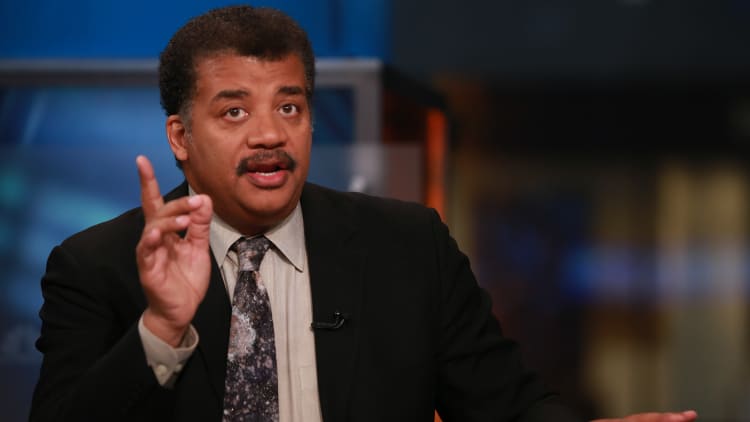
Innovations in science and technology "are the engines" of the economy of the future, said astrophysicist Neil deGrasse Tyson.
"Anything that's going to grow in our economy will derive from innovations in STEM fields," Tyson told CNBC in an interview this week, using the acronym for the fields of science, technology, engineering and math.
Tyson is a big believer in how science and technology have the potential to boost economic growth. In a separate interview earlier this year with CNBC's "On the Money," the scientist predicted the world's first trillionaire would be created in outer space.
Read MoreBuild the economy here on earth by exploring space: Tyson
"I don't think enough people recognize how fundamental science is to what we call civilization," he said. "If you think science is for cherry-picking what result satisfies your social-cultural-political-religious philosophies, then you are not entering the 21st century in a competitive posture."
Thank science for that field goal, Bengals
Tyson is the head of the world-renowned Hayden Planetarium in New York City. He also hosts "Space Talk" on the National Geographic Channel, where he aims to relate the wonders of the universe to the everyday lives of his viewers, including the arcana of football.
On Sunday afternoon in Week 5 of the National Football League's regular season, he took to Twitter to explain how Cincinnati's winning overtime field goal managed to bounce in off the upright.
"I said, 'Wait a minute. [Let's] check some calculations.' And sure enough, it was aided by a one-third of an inch drift from Earth's rotation. So yeah, Earth's rotation enabled that win," Tyson told "Squawk Box" Friday.
Tyson made his case using a baseball analogy.
"If you have a curved surface bouncing against curved surface, as any baseball player knows who has a curved bat and a round ball, a fraction of an inch is the difference between a pop up, a home run or a ground out," he said.
Tyson also discussed the science in "The Martian," the new movie starring Matt Damon, in which his character is left behind on the red planet. Since its Oct. 2 debut, the movie has grossed nearly $150 million.
"I think it was the first movie ever where science and engineering are themselves characters," Tyson said.
"They're responsible for the suspense, the joy, the misery, what makes people anxious — all of these things that are normally the interplay of human emotion, flow through whether or not science and technology problems get solved," he added. "It succeeded in this. It was brilliantly done."
Read MoreNASA, Mars and dodging an asteroid apocalypse
In praising the movie, he paraphrased Mark Twain, who said to get your facts straight first and then you can distort them at your leisure.
"So there are enough facts straight in the movie 'The Martian,' that where they take liberties, I give it to them," Tyson said.
Not surprisingly, Tyson was also tweeting on Wednesday's celebration of "Back to the Future" Day; Oct. 21, 2015, was the date that Marty McFly and company journeyed 30 years ahead to, in the time-traveling trilogy's second installment.
Depicting life in 2015, the movie "Back to the Future II," released in 1985, got some things right, such as fingerprint scanners, but others really wrong, like flying cars. Below are some of the highlights of Tyson's scorecard.


